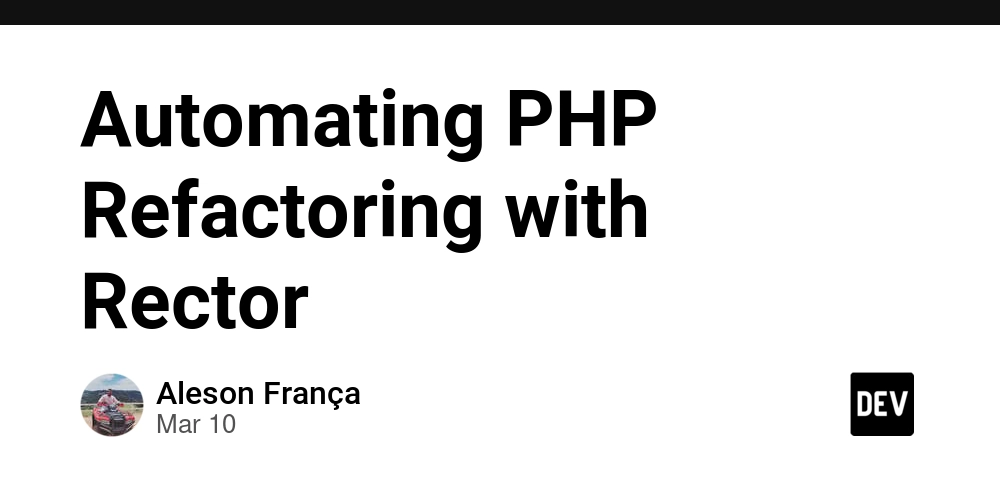Automating PHP Refactoring with Rector
Keeping code clean and updated is important in software development, but refactoring can take a lot of time, especially in big projects. PHP Rector is a tool that helps automate these changes, making sure your code follows best practices and modern PHP standards. What is PHP Rector? Rector is a tool that automatically updates and improves PHP code based on predefined rules. it Can: Upgrade PHP versions. Apply coding standards automatically. Remove old and unnecessary code. Replace outdated function or method calls. Add type hints to properties, function parameters, and return values. Convert old docblocks into modern attributes. Installation You can install Rector using composer: composer require --dev rector/rector Configs To configure Rector, create a rector.php file in your project's root folder:

Keeping code clean and updated is important in software development, but refactoring can take a lot of time, especially in big projects. PHP Rector is a tool that helps automate these changes, making sure your code follows best practices and modern PHP standards.
What is PHP Rector?
Rector is a tool that automatically updates and improves PHP code based on predefined rules. it Can:
- Upgrade PHP versions.
- Apply coding standards automatically.
- Remove old and unnecessary code.
- Replace outdated function or method calls.
- Add type hints to properties, function parameters, and return values.
- Convert old docblocks into modern attributes.
Installation
You can install Rector using composer:
composer require --dev rector/rector
Configs
To configure Rector, create a rector.php file in your project's root folder:
declare(strict_types=1);
use Rector\Config\RectorConfig;
use Rector\Php74\Rector\Property\TypedPropertyRector;
use Rector\Php80\Rector\Class_\DoctrineAnnotationToAttributeRector;
use Rector\Php81\Rector\Class_\SpreadingVariadicArgumentsRector;
return static function (RectorConfig $rectorConfig): void {
$rectorConfig->rule(TypedPropertyRector::class);
$rectorConfig->rule(DoctrineAnnotationToAttributeRector::class);
$rectorConfig->rule(SpreadingVariadicArgumentsRector::class);
};
This example enables:
- Typed properties (PHP 7.4+).
- Conversion of Doctrine annotations to attributes (PHP 8+).
- Modern variadic argument syntax (PHP 8.1+).
Running Rector
To apply Rector to your code, run:
vendor/bin/rector process src
This will analyze and update the code inside the src folder.
Examples
Adding Type Hints to Properties
Before:
class User {
/** @var string */
private $name;
}
After:
class User {
private string $name;
}
Converting Annotations to Attributes
Before:
/**
* @ORM\Entity()
* @ORM\Table(name="users")
*/
class User {
/** @ORM\Id */
/** @ORM\GeneratedValue */
/** @ORM\Column(type="integer") */
private $id;
}
After:
use Doctrine\ORM\Mapping as ORM;
#[ORM\Entity]
#[ORM\Table(name: "users")]
class User {
#[ORM\Id]
#[ORM\GeneratedValue]
#[ORM\Column(type: "integer")]
private int $id;
}
Updating Variadic Argument Syntax
Before:
function sum(...$numbers) {
return array_sum($numbers);
}
$values = [1, 2, 3];
echo sum(...$values);
After:
function sum(int ...$numbers): int {
return array_sum($numbers);
}
$values = [1, 2, 3];
echo sum(...$values);
Conclusion
PHP Rector is a great tool for keeping your code clean and updated with less manual work. You can also add it to a CI/CD pipeline to make sure your project follows best practices automatically.
Do you use Rector in your projects? Share your experience in the comments!












































































































































































![[The AI Show Episode 142]: ChatGPT’s New Image Generator, Studio Ghibli Craze and Backlash, Gemini 2.5, OpenAI Academy, 4o Updates, Vibe Marketing & xAI Acquires X](https://www.marketingaiinstitute.com/hubfs/ep%20142%20cover.png)


























































































































![[FREE EBOOKS] The Kubernetes Bible, The Ultimate Linux Shell Scripting Guide & Four More Best Selling Titles](https://www.javacodegeeks.com/wp-content/uploads/2012/12/jcg-logo.jpg)



![From drop-out to software architect with Jason Lengstorf [Podcast #167]](https://cdn.hashnode.com/res/hashnode/image/upload/v1743796461357/f3d19cd7-e6f5-4d7c-8bfc-eb974bc8da68.png?#)







































































































.png?#)





.jpg?#)






























_Christophe_Coat_Alamy.jpg?#)







































































































![Rapidus in Talks With Apple as It Accelerates Toward 2nm Chip Production [Report]](https://www.iclarified.com/images/news/96937/96937/96937-640.jpg)









































































































































